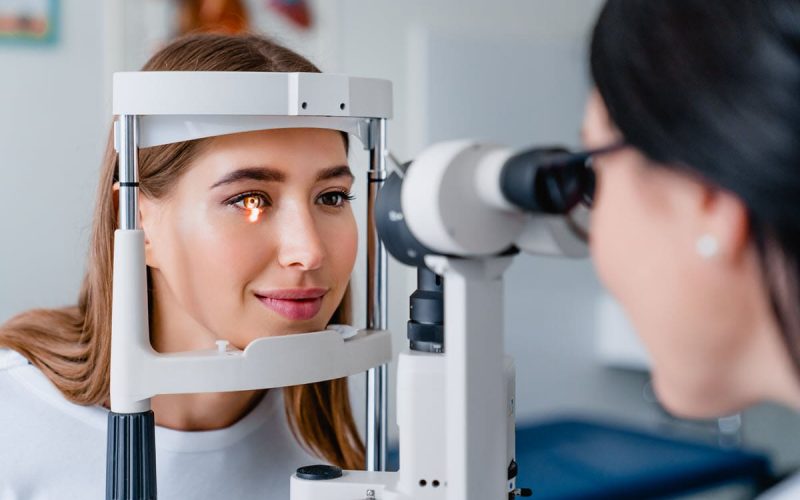Being a university student comes with alot of new experiences that can adversely impact your health and well-being; some of these constant activities happening are late-night study sessions, juggling tedious lectures, social commitments, and constantly fixing eyes on the computer screen, which have a direct impact on the eye.
With these, it’s easy to forget about essential health checks like eye examinations. But you may want to ask, do university students get free eye tests as part of their admission perks? Well, if not, that could be why most students hardly go for eye tests.
Going for regular eye tests is essential for maintaining good vision, especially for university students who spend a great deal of time reading and focusing on screens. These students need to know if these eye tests are free for students.
This article will provide comprehensive information on eye tests for university students in the UK, whether they are free or not. It will also examine the eligibility criteria for accessing free eye tests in the UK, alternatives if you don’t qualify, and valuable tips on how to make the most of your eye test regardless of the cost.
Table of contents
Do Uni Students Get Free Eye Tests?
For many university students, eye tests will not be accessible. Firstly, to receive free eye tests, the student must be under 18, and seeing as most students join university after their 18th birthday, this seems unlikely.
However, more students can receive free eye tests if they meet specific requirements. This could be if their eyesight already has issues or if they are found to be at risk. According to the NHS, you are eligible for free eye tests if you are:
- Are registered as partially sighted or blind
- Have been diagnosed with diabetes or glaucoma
- Are 40 or over, and your mother, father, sibling, or child has been diagnosed with glaucoma
- Have been told by an eye doctor (ophthalmologist) that you are at risk of glaucoma
- Are a prisoner on leave from prison
- Are you eligible for an NHS complex lens voucher – your optician can inform you about this.
Similarly, there are several benefits that you, your partner, or your civil partner receive that allow you to be eligible for free eye care. Also, if you are under the age of 20 and are dependent on someone receiving these benefits, you will be eligible.
The benefits list is as follows:
- Income Support
- Income-related Employment and Support Allowance
- Income-based Jobseeker’s Allowance
- Pension Credit Guarantee Credit
- Universal Credit—You must match the requirements, which you can find by clicking on this link from the NHS.
Do University Students Get Prescription Glasses For Free?
Prescription glasses aren’t provided free of charge to university students. However, if you meet the criteria, there are pathways to secure financial assistance. Nevertheless, if the cost of your glasses surpasses the funding you receive, you’ll need to cover the remaining amount.
This financial support takes the form of Optical Vouchers issued by the NHS to those who are:
- Under 16 years old
- Aged 16, 17, or 18 and engaged in full-time education
- On temporary release from prison
- Eligible for an NHS complex lens voucher – your optician can offer details on this.
The value of your Optical Voucher hinges on the strength of your lenses. For comprehensive information, consult the NHS links available here and here.
Likewise, several benefits you, your partner, or your civil partner receive can qualify you for free eye care. Additionally, if you’re below 20 and dependent on someone who receives these benefits, you’re also eligible.
The list of benefits encompasses:
- Income Support
- Income-related Employment and Support Allowance
- Income-based Jobseeker’s Allowance
- Pension Credit Guarantee Credit
- Universal Credit – You must satisfy the prerequisites, which can be found by visiting this NHS link.
This setup parallels the eye care eligibility criteria, with the distinction that specific options are more limited. Another commonality is a scheme for low-income individuals, accessible through this NHS link.
Can You Claim A Refund For Eye Tests If You Paid For Them?
If you think you qualify for cost-free NHS eye care but ended up paying for it, you can request a reimbursement. Ensure you obtain the optometrist’s receipt and submit your claim within three months from the payment date.
Eye Tests Are Essential; You Only Get One Pair In Your Lifetime!
Were you aware that you’re entitled to free eye tests as a student at certain stores and through the NHS? We’ll guide you on how and where to access these complimentary eye tests and inform you about student discounts available at opticians. Additionally, we’ll underscore the significance of regular eye examinations.
Places Uni Students Can Get A Free Eye Test.
In the past, stores like Tesco, Boots, and Specsavers used to provide free eye tests for students. However, this is no longer the situation.
But don’t worry; there are still options for students to access free or low-cost eye tests and discounts on eyewear. Here are alternative places to find these benefits if you’re a student.
Ace & Tate FREE student eye test
Ace & Tate currently provides complimentary eye tests for students. Additionally, they have an exclusive student discount offer – when you spend £100 or more on prescription glasses, you’ll receive a £10 voucher.
To take advantage of these benefits, explore Ace & Tate’s locations to find the nearest branch and schedule an eye test.
Moreover, the NHS also offers eye test vouchers and eyewear assistance based on specific criteria. You can receive a free NHS sight test if:
- You are under 16
- You are between 16 and 18 and in full-time education (excluding university)
- You are 60 years old or above
- You are registered as partially sighted or blind
- You have been diagnosed with diabetes or glaucoma
- You are 40 years old or above and have a family member diagnosed with glaucoma.
- An eye doctor (ophthalmologist) has identified you as at risk of glaucoma
- You are a prisoner on temporary release
- You are eligible for an NHS complex lens voucher (your optician can provide details on your eligibility).
Explore these options to ensure you maximize available eye care benefits.
Read Also: 17 Best Online English Literature Tutoring Services in 2024
Boots Optician’s Student Eye Tests
Boots no longer offers free eye tests (unless eligible under NHS regulations) but offers a generous Boots opticians student discount at 10% off prescription glasses and more.
Acuitis Opticians & Hearing Care
Get a free eye test and 2-for-1 on glasses with our Acuitis Opticians student discount.
Rawlings Opticians
Get a 15% Rawlings Opticians student discount on all eyewear.
Lenstore student eye test
Get 20% off when you use our Lenstore student discount.
Feel Good Contacts
Get 16% off if you’re a new customer or a 5% student discount for existing customers at Feel Good Contacts.
Vision Express
Get a 20% student discount at Vision Express or save 30% when you spend £50 or more in-store and get a free eye test.
What Is The Cost Of An Eye Test In The UK?
The standard cost for an eye test typically ranges from £20 to £25. The price can depend on whether you opt for local independent opticians or larger chain stores. The Department of Health and Social Care (DHSC) has confirmed an increase in General Ophthalmic Services (GOS) fees for sight tests, going from £21.71 to £22.14.
However, there are scenarios where you might qualify for assistance in covering the cost of your glasses through an optical voucher. This is applicable if you meet any of the following criteria or if you are under 20 years old and are financially dependent on someone who meets these criteria:
- Income support
- Income-related Employment and Support Allowance
- Income-based Jobseeker’s Allowance
- Pension Credit Guarantee Credit
- Universal Credit
Being eligible for these benefits could help alleviate the expense of eyewear.
Are Eye Tests Free In Scotland?
If you reside in the UK, you are eligible for a cost-free NHS eye examination in Scotland. These assessments vary from those you might have undergone in different regions of the UK.
They encompass more than just evaluating your vision; they entail a comprehensive inspection of your eye health to identify potential indicators of other medical issues. This approach ensures that any eye-related concerns can be detected prior to escalating into more significant problems.
Yet, it’s worth noting that specific types of eye examinations may have associated charges. To gather further details, refer to the NHS resource on eye examinations in Scotland.
Read Also: What is a Diploma in the UK?
How Often Can I Have A Free NHS Sight Test?
It is advisable to undergo an eye examination every two years, even for free student eye tests. If you have heightened concerns about your eye well-being, contact your ophthalmic practitioner or optometrist. They can evaluate whether earlier appointments are warranted, although these early assessments might entail additional charges.
Read Also: How to Get Copies of GCSE Certificates from Years Ago
Reasons To Get An Eye Test
Consistently undergoing eye examinations can contribute to the early detection and correction of any issues. Here’s a comprehensive compilation of motives to undergo regular eye tests:
- Attaining accurate prescriptions can enhance your overall quality of life.
- Eye tests can unveil conditions that might be inconspicuous, like cataracts or glaucoma.
- Sustaining a good vision is pivotal for your everyday safety.
- It’s an opportunity to ascertain whether your present prescription necessitates stronger or weaker adjustment.
- Ensuring your compliance with legal prerequisites for driving and operating vehicles.
- Remember, your eyes are irreplaceable!
Are There Discounts For Students?
- Regarding eye exams and vision care, university students have a few options. There are discounts available that can help make the costs of seeing an optometrist more affordable for them. Here’s what they need to know:
- Many universities offer free or discounted eye tests for their student body. It’s best to ask about any deals and offers on vision care services at the campus health center.
- Most optical stores also offer special discounts for college students with valid identification, such as a school ID card. These could include lower prices on contact lenses or eyeglasses frames or buy-one-get-one-free deals on specific products or services.
- Some private insurance companies may even cover some of the cost of an annual eye exam if you’re enrolled in full-time studies at a postsecondary institution, so check your policy and see what coverage is offered.
- No matter which route one chooses, it pays to research ahead of time when looking into ways to save money on vision care while attending university. Knowing where to look can often lead to big savings and allow students to take better care of their eyes without breaking the bank!
What Are The Eligibility Requirements?
- The consideration of income often plays a role in determining eligibility for eye examinations and treatment. Depending on the program, individuals might be required to fulfill certain income thresholds or demonstrate financial necessity.
- Moreover, age criteria could apply, as specific programs might be limited to particular age brackets or those under 18.
- Insurance prerequisites can also differ. Some programs mandate proof of insurance coverage, while others might waive this prerequisite.
- It’s important to emphasize that the eligibility of university students for free or discounted eye care services can vary, contingent upon the specific program.
- Ultimately, the qualifications for eligibility will fluctuate depending on the particular program. Conducting thorough research about the program beforehand is the most effective approach to discerning the particulars.
Income Requirements
- The criteria for university students to access financial aid or health insurance coverage often involve income considerations.
- For instance, those unable to demonstrate a specific level of financial need do not qualify for applying for funds and must explore alternative methods to cover expenses related to eye tests.
- In general, students engaged in full-time employment might possess sufficient disposable income to manage the expense of an eye test, whereas others could encounter challenges in meeting this requirement.
- Moreover, it’s essential to recognize that numerous universities extend discounted rates based on student status and eligibility. However, utilizing these opportunities can be challenging if the documentation isn’t readily accessible.
- Ultimately, each student is responsible for confirming their compliance with all pertinent criteria when seeking assistance for medical expenses, including eye tests.
Age Requirements
- Apart from income prerequisites, eligibility for financial aid and reduced rates can also be influenced by age constraints. Specific age thresholds, whether minimum or maximum, could determine one’s qualification for assistance, contingent upon the university’s policies.
- For instance, students under 18 might require a parent’s or guardian’s endorsement before applying for funds. Conversely, individuals over 25 might not align with the criteria set by their institution. As a result, each student must confirm the precise age criteria at their respective school to avoid potentially missing out on valuable resources.
- Ultimately, being aware of these conditions in advance helps ensure that everyone has an equitable chance at success, regardless of their circumstances.
Insurance Requirements
- Besides income and age considerations, eligibility for financial aid or reduced rates may also involve insurance prerequisites.
- Most universities mandate that students furnish evidence of health insurance before applying for student loans or other forms of assistance. This requirement ensures that the students have adequate coverage during any medical emergencies.
- Without this documentation, the university may withhold access to specific resources.
- Everyone must grasp these regulations in advance, as a lack of understanding about the necessary documents could result in the denial of funds.
- Thankfully, many educational institutions have staff members who can address queries about the requisite paperwork for attaining financial aid.
- Utilizing this service can ensure that valuable opportunities are not missed due to a lack of awareness.
Read Also: 15 Best A-Level Subject Combinations: What A-Level Subjects Go Well Together?
What Other Options Are Available?
- Eye exams can indeed be costly, making it challenging for university students to cover these expenses. A recent study indicates that the average price of an eye exam in the United States is $206.
- Nevertheless, there are strategies available for students to mitigate these expenditures. Many optometrists extend student discounts on exams and eyewear, provided students present their valid student ID during purchases. Furthermore, some insurance plans partially or even entirely cover the cost of eye exams, contingent upon the plan type and provider.
- Numerous companies offer exclusive deals for students who are considering purchasing new glasses or contacts. For instance, Vision Direct offers discounts of up to 30% on selected frames and lenses for college or school program enrollees.
Additionally, online retailers like Warby Parker often furnish complimentary shipping and virtual try-on tools, enabling customers to make well-informed choices regarding eyewear acquisitions from the comfort of their homes. - Ultimately, university students can find economical solutions to meet their eye care requirements by conducting thorough research and exploring various options.
Frequently Asked Questions about Free Student Eye Tests
Yes, but you have to be aged 16, 17, or 18 and be in full-time education. There are some exceptions, though.
Students who attend University, unfortunately, can’t get a free eye test under the NHS and therefore have to pay for it.
The typical price for an eye test is between £20-£25, depending on whether you use local opticians or a larger chain.
Suppose you’re between 16-18 years old and in full-time education (excluding university). In that case, you’re eligible for a free NHS optical voucher for the cost of a pair of glasses, meaning free drinks for students (in some cases…).
It’s recommended that you get an eye test every two years. However, if you’re especially concerned about your eye health, you should contact your ophthalmic practitioner or optometrist so they can assess if earlier appointments are necessary.
Conclusion
Your eyes are very important to you; their well-being is paramount to your success. So, your eye health is an investment in your overall well-being, and trivializing eye tests can have serious consequences in the long run. Even if your university does not offer free eye tests, you can find out about other alternatives available to you.
References
- thinkstudent.co.uk
- www.studentbeans.com – Free Student Eye Tests 2024
- acrosophy.co.uk – Do University Students Pay For Eye Tests?





